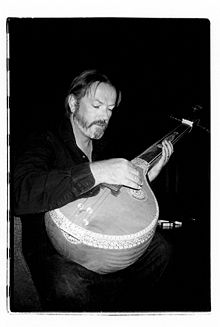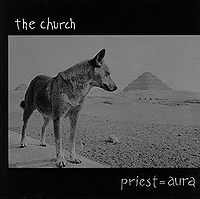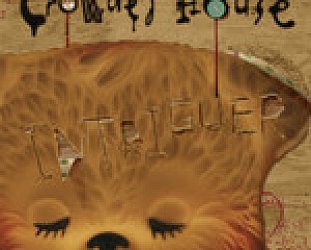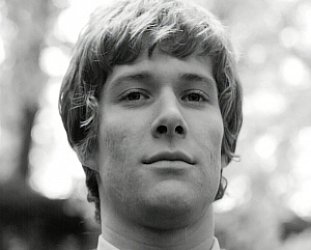Graham Reid | | 9 min read
The Church: Day of the Dead (from Sometime Anytime, 1994)

Fourteen years after springing their
classic paisley-pop hit An Unguarded Moment, six years on from
picking up an American gold disc for their album Starfish and looking
at a back-catalogue of releases that reaches dangerously close to
double figures, the Church -- now trimmed back to founder members
Steve Kilbey and Marty Willson-Piper after the departure of bassist
Peter Koppes - are still making albums.
And to hear Willson-Piper tell it from
his home-cum-studio in Stockholm, they are making them better than
ever.
And he‘s probably right.
While those early Church albums peeled
off the guitar-jangle of the Byrds and Sixties Britpop, they
progressively discovered -- with the acknowledged assistance of
illicit substances -- a distinctive, swirling, other-world ambience
driven by Willson-Piper's guitars and coloured by Kilbey’s
evocative, chemically enhanced lyrics.
But albums such as the textured
brilliance of Priest = Aura of two years ago (an Essential Elsewhere
album, here) and the similarly conceived but harder edged new one
Sometime Anywhere are mere punctuation marks in the lives of Kilbey (left) and Willson-Piper, whose solo albums stack up to an impressive
mini-catalogue on the side.
That’s what happens when you each
have home studios -- Kilbey’s in Sydney, although at present he
lives in Stockholm like long-time Swedish resident Willson-Piper --
and when you are as in demand as these journeymen.
Since July last year when the pair of
them finished Sometime Anywhere, a title which as much describes
their peripatetic work ethic as the ambient, techno-tinkered guitar
rock contents, Willson-Piper can tick off a long list of side
projects: he worked with former Fall member Brix Smith in Los
Angeles; with a band called Lulabox in London; the drummer and
bassist out of All About Eve (with whom he has recorded two albums)
have joined him for a new band called Never Swallow Stars and they’ve
got an album deal; there’s been the offer of playing on Aimee
Mann’s new album to be recorded in Boston (he co-wrote a song with
her on her previous album), the Church did two acoustic shows in
London . . . umm, anything else?
Oh yeah, of course. the Church did a
three-week acoustic tour of America which meant he couldn’t open in
a solo set for Crowded House when they played in Stockholm. He was
doing the Church's business in Las Vegas at the time.
Given that constant work/pleasure
life-style, it's hard to believe he’s been nailed down for this
interview.
And indeed it was entirely chance. He’s
just come home from having a drink, it’s after midnight and he was
just going through to have one last look at the new mixing desk,
trying to figure it out, before turning in for the night. He thought
the interview was scheduled for tomorrow, but he’s happy enough to
speak now because tomorrow was going to be a really busy day - “and
Steve was coming in tomorrow night, so at this time tomorrow you'd
have found us doing some recording for another Church album.”
And so it goes on for these Churchmen:
tours, albums, side projects, a changing band line-up, new ideas . .
.
For Willson-Piper the doors of
perception opened up again when Koppes called it a day two years back
after their tour of Australia. But don‘t suggest -- as has been
widely publicised -- that it allowed him greater input into a band
which has often been characterised as the vehicle for Kilbey’s
megalomania.
“The perception of the Church as
being very Steve-oriented has always been an Australian, or
Australasian, I might say, perception." he says of Kilbey, whose
extramural activities are as diverse as his own. “I mean, I’ve
been in this band 14 years; do people not think he listens to what I
say?
“Certainly in the early days he was
writing most things, but that hasn’t been the case for a long time.
But -- and this is not an insult to Peter, who was great -- when
Peter left the band, the Church suddenly became more interesting
because all the usual role-playing went out the window. So I could be
in the studio singing, playing bass, writing words or whatever. It
all became more fluid.
“And although Steve's living here
now, for this album he was in Sydney and because we've both got
studios we could write songs on to multitrack and worry about the
words or whether there could be drums on something much later. It was
a much more free recording process and very open-ended.
“People always said that it wouldn’t
work with me being here -- I‘ve been here for eight years for God's
sake -- but of course it does. People can live and work anywhere.
Chris Bailey is living in Malmo."
he says referring to the former Saint singer/songwriter.
“For me it's very strange; I‘m an
English person in an Australian group who're most successful in
America and I've got a studio in Stockholm. I spend all my time
running from one country to another doing what I‘ve got to do. It`s
not a problem being here . . . . but it is ridiculous we’ve been
together so long. But we’re making better records than 22-year-olds
who are making crap records . . . and there are plenty of them out
there."
Which sounds like you’d not be
auditioning for the job in Suede, Marty?
"Well, I was thinking about it.
Really! I like Suede but I‘ve got an intimate problem with that
because Juliana from All About Eve is – and here's a scoop for you
- making an album with [Suede’s departed guitarist] Bernard Butler
in France. You don’t get any more hot news than that. Now, what did
you want to know about the Rolling Stones?" he laughs.
Willson-Piper is a lively
conversationalist who seems most proud of just three things which
recur like refrains through this late-night chat.
In no particular order they are the
Sometime Anywhere album (“I think it's just beautiful”); his new
girlfriend (“she's just beautiful"); and his new 24-track
studio: “It’s beautiful, you should see it, there’s a huge
record library of 15,000 albums. all my books, loads of weird things
picked up on my travels and all my guitars are here. lt’s just
great."
Without seeing girlfriend and studio,
we have to take his word about them, but he’s certainly right about
the album, which scored a rare four and a half stars in Rolling Stone
and drew Herald critic Russell Baillie to observe that while “the
choir may have got smaller, the hymns are better" and the pair
at the helm have made “a mesmerisingly fine album that doesn’t
rely on the paisley-tinged guitar jangles of old but on hypnotic
rhythms, arrangements and some truly levitational choruses."
The album is also punctuated by some
entrancing North African melodies, Willson-Piper playing as if he
were both Richard Lloyd and Tom Verlaine of Television on the
interlocking guitars of the centrepiece The Maven, and the album is
typically shot through with Kilbey's cynical, bitter lyrics which
seem to refer to the nature of the industry within which they
operate.
And that last point is one which
Willson-Piper picks up with enthusiasm. Suggest to him you’ve read
that their last outing. the lovely Priest = Aura, was a commercial
failure and he comes back hard and fast.
“There's no such thing as commercial
failure in the Church because we don’t make records for commercial
success. If anyone’s out there making records for commercial
success,” he says, contemptuously coiling his tongue round the
words, “then fuck them, they can go back to being an accountant. We
just do our best, writing and recording the best song we can.
“The only reason the Church got big
in America was because Steve and his ex-girlfriend wrote a song which
happened to have a huge catchy melody that everybody liked [Under the
Milky Way] and all of a sudden we’d sold half a million records.
“But we don’t make albums for
people who like stupid catchy melodies. We make albums for people who
like an interesting record."
And with its shimmering or serrated
guitars, sharp-edged samples and, yes, huge catchy melodies in
places, Sometime Anywhere is certainly an interesting album. Not
quite the one Kilbey and Willson-Piper intended, though.
Kilbey is on record as saying how he’s
livid about the American record company Arista shuffling the stacked
deck of tracks to put on to the album some songs which the band felt
were better placed on the seven-track additional disc which comes
with Sometime Anywhere.
Willson-Piper says the company
exercised its right under a “leaving member clause" after
Koppes' departure to grab back a little creative control.
Willson-Piper has an expletive-included view of that: “We resent it
right down to the bone, them putting Business Woman and Authority on
the album; [included on the bonus disc] there instead.
“You don’t sign the Church then
fuck with our fucking creativity. You don’t work in the fucking
music business then listen to what the fucking music business tells
you. I‘m the guy playing the fucking guitar and writing the fucking
songs and these fucking guys are just there to put it in the fucking
shop. Big deal. Try writing a song. Watch me put a fucking record in
a fucking shop.
“I’ll succeed but I’d like to see
some fucker in some fucking record company write a song. And changing
thing on the album is like . . . well, you don’t get the Mona Lisa
and put a moustache on it!”
Well, Marcel Duchamp did, actually.
“Yeah, but he was being ironic. If it
was ironic putting Business Woman on the record I wouldn’t mind.
And if Duchamp was president of some record company, things would be
great, we’d get some interesting music,” he laughs.
It's time to go.
Willson-Piper has that
mixing desk to puzzle over and plans for more recording with Kilbey
tomorrow.
“You know, the Church is the most
successful thing we do, so we look at each other and say, ‘Yeah,
we’ve been making records for 14 years, but why wouldn’t we want
to continue doing this when we’re not making bad records, getting
on just fine, got a major record deal and all that? So how about we
just continue?”
No arguments against from this end,
Marty.







post a comment